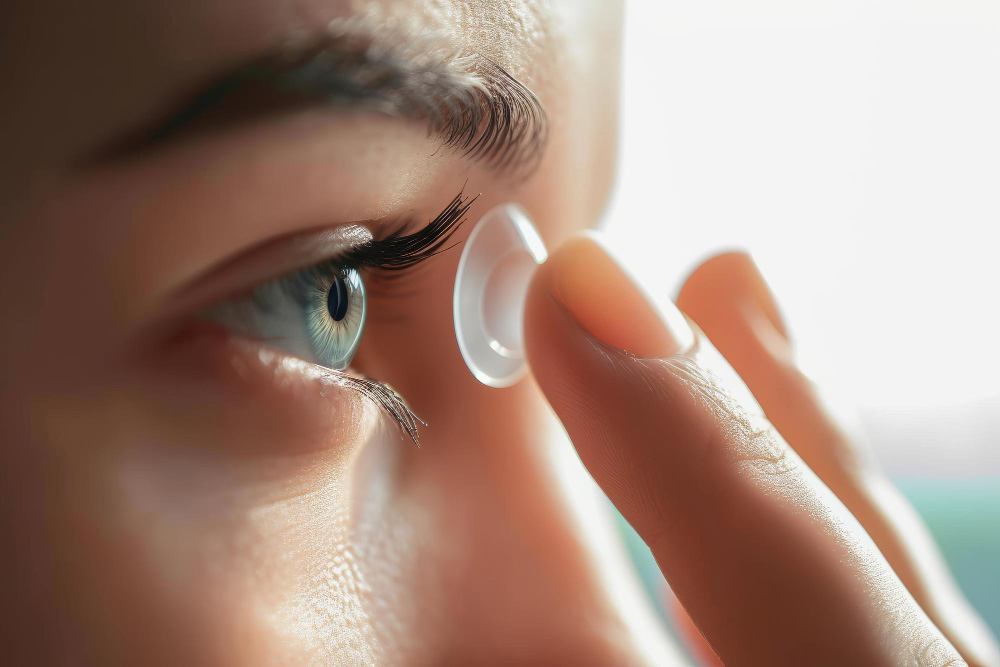How to Choose the Right Contact Lenses for Your Eyes September 4, 2024

Choosing the right contact lenses is essential for both comfort and eye health. With so many options available, it can be overwhelming to find the perfect pair for your eyes. Whether you’re new to contact lenses or looking to switch to a different type, understanding your specific needs and preferences is key to making the right decision. In this article, we’ll guide you through the factors you need to consider when selecting the best contact lenses for your eyes.
1. Understand Your Vision Needs
The first step in choosing the right contact lenses is understanding your vision needs. Contact lenses are designed to correct various vision problems, including:
- Nearsightedness (Myopia): Difficulty seeing distant objects clearly.
- Farsightedness (Hyperopia): Difficulty seeing close objects clearly.
- Astigmatism: A condition where the cornea is irregularly shaped, causing blurry vision at all distances.
- Presbyopia: Age-related difficulty in focusing on close objects, typically requiring multifocal lenses.
Your eye doctor will prescribe the type of lenses based on your specific vision condition. If you have astigmatism, for example, you’ll need toric lenses, which are specially designed to correct the irregular curvature of the cornea.
2. Soft vs. Rigid Gas Permeable (RGP) Lenses
One of the most important decisions you’ll make is choosing between soft contact lenses and rigid gas permeable (RGP) lenses. Each type has its benefits, and the choice will largely depend on your lifestyle and comfort preferences.
- Soft Contact Lenses: These lenses are made from soft, flexible materials that allow oxygen to pass through to the cornea. They are comfortable, easy to adjust to, and ideal for active individuals. Soft lenses are available in daily, weekly, and monthly disposables.
- Rigid Gas Permeable (RGP) Lenses: These lenses are made from durable materials that retain their shape on the eye. They provide crisp, clear vision and are often recommended for people with astigmatism or presbyopia. Although they may take longer to get used to, RGP lenses tend to last longer and are more resistant to deposits.
3. Daily vs. Extended Wear Lenses
Another important consideration is how often you plan to wear your lenses and for how long each day. Contact lenses come in different wearing schedules, and choosing the right one depends on your lifestyle and comfort needs:
- Daily Disposable Lenses: These lenses are worn for one day and then discarded. They are convenient, require no cleaning, and reduce the risk of eye infections. They are perfect for occasional wearers or those who prefer a fresh pair of lenses every day.
- Weekly/Monthly Lenses: These lenses are designed to be worn daily for one to four weeks, depending on the brand. They require regular cleaning and storage but can be more cost-effective for frequent wearers.
- Extended Wear Lenses: Extended wear lenses can be worn continuously for up to 30 days, including overnight. However, not everyone’s eyes can tolerate this type of wear, so it’s important to consult your eye doctor before choosing this option.
4. Consider Your Eye Health
Your eye health plays a crucial role in determining the right contact lenses for you. If you suffer from dry eyes, for example, you may need lenses designed to retain moisture. Look for lenses made from silicone hydrogel, a material that allows more oxygen to reach the eyes and helps prevent dryness.
Additionally, if you have sensitive eyes or allergies, you might benefit from daily disposable lenses, which reduce the buildup of allergens and bacteria. Consult your eye doctor if you have specific concerns about your eye health, as they can recommend the best lens material for your needs.
5. Colored vs. Clear Contact Lenses
If you’re looking for a cosmetic enhancement along with vision correction, colored contact lenses are a great option. They come in a variety of shades, from natural-looking colors that enhance your eye color to bold, dramatic shades for a more striking look. Colored lenses can be either prescription or non-prescription, so even if you don’t need vision correction, you can still enjoy changing up your eye color.
For those who prefer a subtle or invisible look, clear lenses are the way to go. They offer vision correction without altering your natural appearance, making them ideal for everyday wear.
6. Lens Care and Maintenance
If you choose weekly, monthly, or extended wear lenses, proper lens care is essential to maintain eye health and prevent infections. Be sure to clean and store your lenses as directed by your eye doctor or the lens manufacturer. Use only the recommended cleaning solutions and replace your lens case regularly to avoid contamination.
If you prefer a hassle-free option, daily disposable lenses are ideal because they don’t require cleaning or storage. Simply discard them after each use, and start fresh with a new pair the next day.
7. Consult Your Eye Doctor
Finally, the most important step in choosing the right contact lenses is consulting with your eye doctor. They can assess your eye health, vision needs, and lifestyle to recommend the best type of lenses for you. Your doctor can also provide a fitting to ensure your lenses are comfortable and sit properly on your eyes.
Conclusion
Choosing the right contact lenses involves more than just picking a brand or color. By considering your vision needs, eye health, lifestyle, and preferences, you can find the perfect pair that offers both comfort and clarity. Whether you opt for daily disposables, extended wear lenses, or colored lenses, always prioritize your eye health and consult your eye doctor to make the best choice for your eyes.
